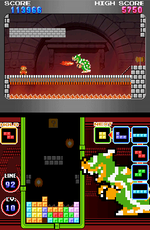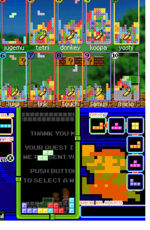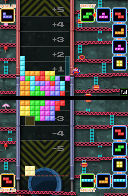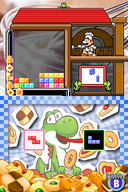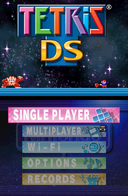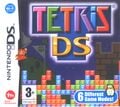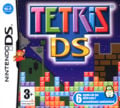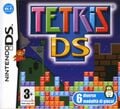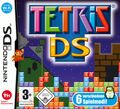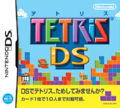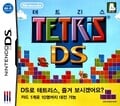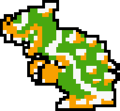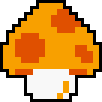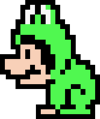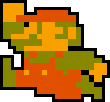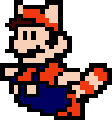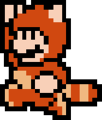Tetris DS
| Tetris DS | |||||||||||||
|---|---|---|---|---|---|---|---|---|---|---|---|---|---|
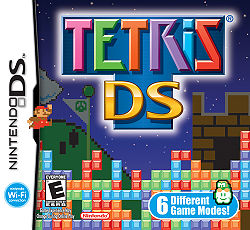
| |||||||||||||
| Developer | Nintendo SPD Group No.2 | ||||||||||||
| Publisher | Nintendo | ||||||||||||
| Platform(s) | Nintendo DS | ||||||||||||
| Release date | |||||||||||||
| Language(s) | English (United States) French (France) German Spanish (Spain) Italian Japanese Korean | ||||||||||||
| Genre | Puzzle | ||||||||||||
| Rating(s) |
| ||||||||||||
| Mode(s) | Single-player 2-10 local multiplayer 2-4 Wi-Fi | ||||||||||||
| Format | Nintendo DS:
Game Card
| ||||||||||||
| Input | Nintendo DS:
| ||||||||||||
| Serial code(s) | |||||||||||||
- “Do you Tetris with others?”
- —Tetris DS tagline
Tetris DS is a puzzle game for the Nintendo DS released in 2006. Though it is a standard Tetris game, Tetris DS was both developed and published by Nintendo, who capitalized on some of their games and franchises, including Super Mario, as the backdrops and inspiration for the Tetris action.
Gameplay[edit]
The uniting theme behind any Tetris title is to arrange Tetriminos, shapes made of four colored blocks, into horizontal lines in a 10 block wide well. When a row of the well is filled with blocks, regardless of color, the row will disappear and a player’s score will increase. Bonus points are awarded for clearing more than one row at once. Clearing four lines is called a "Tetris," and is worth the most points. However, as soon as one mass of blocks is laid, another begins to fall. If the blocks ever overflow out of the arena, the player fails. Unlike most other puzzlers, such as Puzzle League, the blocks do not always come in the same arrangement. Instead, there are seven different block patterns. They may be rotated as a group, even when first landing on other blocks or the floor, but their form will not change. Also, players may speed up the game by warping blocks to the floor in certain modes instead of waiting for them to fall. Markers at the floor show where they will land. It is also possible to "hold" a Tetrimino until it is needed later.
Tetris DS sets itself apart through its wide variety of modes. Each mode keeps the same basic rules intact, but is very liberal with them. Also, up to ten people can play against each other at once with local multiplayer. The main draw of the game is the utilization of the Nintendo Wi-Fi Connection, which allows for multiplayer games for two to four players.
This title is truly a compilation of six game play modes: Standard, Push, Touch, Puzzle, Mission, and Catch. Each mode is themed after a particular famous Nintendo title and utilizes its own goals and rules. However, all revolve around the original Tetriminos concept. Only the Standard, Push, and Puzzle feature Super Mario themes; Touch mode is themed after Balloon Fight, Mission mode is themed after The Legend of Zelda, and Catch mode is themed after Metroid.
Modes with Super Mario content[edit]
Standard[edit]
- Play Modes: Single player, local multiplayer, Wi-Fi
- Theme: Super Mario Bros., Super Mario Bros. 3, The Legend of Zelda, Metroid, Donkey Kong, Balloon Fight, Ice Climber, Excitebike, Devil World, Urban Champion, Duck Hunt, Tetris
Standard mode is a version of the basic Tetris game; it has no new twists or new rules in single-player mode compared to other games based on the Tetris Guideline. However, it does keep the ability to rotate blocks after they have landed, which was introduced in Tetris Worlds. This concept is relatively new to the series, but it was altered for this version, and a time limit in multiplayer mode adds back some of the challenge that it took away when the infinite spin concept was first introduced.
Each time ten lines are cleared, the theme of the level changes and difficulty increases. Slightly modernized game footage from one of Nintendo's classic games encased in what appears to be a television can always be seen on the top screen while a sprite from the same game sits to the right of the play field on the touch screen. The background songs are remixes of classic songs from the featured game. However, the meters and play field are never altered. In multiplayer mode, the top screen is dedicated to the opponents' play fields.
In multiplayer mode, clearing multiple lines will dump more blocks onto the player with the target mark on their play field on the top screen. An additional offensive element comes in the form of items. The game gives players the choice to play traditional Tetris or to play with items inspired by Super Mario Bros. and the Mario Kart series.
Marathon levels[edit]
These are the Marathon levels with Super Mario content.
| Level | Lines | Top screen theme | Touch screen background | Touch screen sprite | Music |
|---|---|---|---|---|---|
| 1 | 0-9 | Super Mario Bros. World 1-1 |
World 1-1 Flagpole and Castle |
Mario | Mario Tetris |
| 2 | 10-19 | Super Mario Bros. World 1-1 |
World 1-1 Brick Blocks with revealed Vine |
Goomba | Mario Tetris |
| 3 | 20-29 | Super Mario Bros. World 1-2 |
World 1-2 Bonus room |
Green Koopa Troopa | Basement Tetris |
| 4 | 30-39 | Super Mario Bros. 3 Grass Land |
Grass Land | Raccoon Mario | Mario Tetris 3 |
| 5 | 40-49 | Super Mario Bros. 3 World 1-1 |
Grass Land | Frog Mario | Mario Tetris 3 |
| 6 | 50-59 | Super Mario Bros. 3 World 1-1 |
Grass Land Castle interior |
Tanooki Mario | Mario Tetris 3 |
| 7 | 60-69 | Super Mario Bros. World 1-2 |
Underground level | Lakitu | Basement Tetris |
| 8 | 70-79 | Super Mario Bros. World 4-3 |
World 6-2 Piranha Plants |
Super Mushroom | Mario Tetris |
| 9 | 80-89 | Super Mario Bros. World 4-3 |
World 4-3 Balance Lift |
Crouching Luigi | Mario Tetris |
| 10 | 90-99 | Super Mario Bros. World 2-4 Bowser fight |
World 2-4 | Bowser | Bowser Battle |
| 13 | 120-129 | Donkey Kong 25m |
75m | Pauline | Tetris DK |
| 20 | 190-200 | Tetris (Game Boy version) Japanese box art |
Tetris Russian castle |
Space shuttle | Ancient Tetris |
Multiplayer items[edit]
Items appear only in multiplayer mode and are earned by clearing special ? Blocks that appear within a Tetrimino. All of them are from the Super Mario franchise
- Mushroom: While traditionally a beneficial item, when used on an opponent in this game it speeds up the descent of the Tetriminos.
- Boo: The player's opponents will not be able to see the upcoming blocks, destroying their foresight.
- Banana: This item flips the playing field horizontally. While at first this appears relatively useless, the formations of blocks coming from the ceiling do not change, meaning that it is most effective against people who have played the classic game before.
- Lightning: The affected players cannot rotate their Tetriminos for a set period of time.
- Red Shell: Usually an offensive item, in this game the Red Shell is defensive. Two rows will be cleared from the user's play field.
- Super Star: The user becomes invincible to their opponents' attacks. Additionally, the user receives only the straight I Tetriminos.
Push[edit]
- Play Modes: Single player, local multiplayer, Wi-Fi
- Theme: Donkey Kong
Push Mode was designed for players who wanted a more competitive way to play than just comparing scores. Players are virtually seated across from each other, with a pile of blocks in the center. The Tetriminos are like missiles in this mode, and can be sent by the player just as quickly as they can play the game. If one clears a row, the mass moves toward their opponent, decreasing the opponent’s play area and increasing the player's. The player who pushes the pile all the way out of the screen towards their opponent wins.
The mode is decorated by a Donkey Kong-inspired environment. Pauline and Donkey Kong can be seen at the very top of the screen when it scrolls, and Mario walks around the girders on the top screen, dodging barrels and using the ladders. Mario's Hammer and Pauline's Parasol are located to the left of the playing field. Also, as ones play field grows smaller, fire erupts from the oil drum at the bottom of the screen. In the original game, barrels burned up when they hit this fire. The classic Donkey Kong beeps play in the background. It speeds up as the blocks near one of the edges.
Puzzle[edit]
- Play Modes: Single player
- Theme: Yoshi's Cookie
Puzzle mode presents players with the challenge of clearing all of the blocks already on their screen using only the blocks in their inventory. To succeed players need to think ahead and know how the puzzle will change based on each possible outcome. The Tetriminos can be rotated in any direction before being dropped, but once a location is selected, players cannot manipulate them. However, there is no time limit, so players may think for as long as they need.
This mode takes place in Mario's bakery from Yoshi's Cookie, more specifically, the NES version of the game, as Mario is in his chef outfit. However, instead of Yoshi Cookies in the oven, there are Tetriminos. Mario sits to the right operating the machine while Baby Yoshis hold a sign showing the puzzle's level number. The touch screen's background is decorated with the promotional artwork from the game featuring Yoshi in a pile of cookies, which shows a winking Yoshi when the puzzle is cleared.
Music[edit]
Music is a feature located in the Options menu where the player can listen to "records" of songs heard throughout Tetris DS, most of which are arrangements of music from the represented Nintendo games. The following table lists the Super Mario-themed songs:
| # | Song title | Based on | Notes |
|---|---|---|---|
| 1 | Mario Tetris Standard Lv. 1, 2, 8, 9 |
Ground Theme Super Mario Bros. |
|
| 6 | Total Yoshi Puzzle |
Type A Yoshi's Cookie |
|
| 7 | DK Push Push |
Level Start / 25m BGM Donkey Kong |
This song is taken directly from Donkey Kong, and does not feature the winning and losing variations heard in Push mode. |
| 8 | 10,000 Tetris Points Record |
High Score Tetris (Game Boy) |
|
| 12 | Mario, Link, and Yoshi Title Screen |
— | Although original, the song incorporates sound effects from different Nintendo games. |
| 13 | Basement Tetris Standard Lv. 3, 7 |
Underground Theme Super Mario Bros. |
|
| 14 | Mario Tetris 3 Standard Lv. 4, 5, 6 |
Ground Theme Super Mario Bros. 3 |
|
| 15 | Bowser Battle Standard Lv. 10 |
Shiro BGM Super Mario Bros. |
|
| 16 | Tetris DK Standard Lv. 13 |
25m BGM Donkey Kong |
|
| 20 | Ancient Tetris Standard Lv. 20 |
Type A Tetris (Game Boy) |
|
| 21 | CongraTetris Ending |
— | While the song is mostly original, arrangements of the Super Mario Bros. Ground and Invincibility Themes and the Donkey Kong 25m BGM play at the end. |
Other cameos[edit]
Several other cameos that are not part of the main game play are also included in the game.
Title screen[edit]
Many of the game's featured characters appear in the top screen if players wait at the title screen. The following Super Mario cameos are in order of appearance.
- Donkey Kong: Donkey Kong and Mario appear on screen, where the blocks are used as barrels. Donkey Kong throws them at him, who smashes them with the hammer. Occasionally, Donkey Kong Jr. will climb down the right side of the screen, distracting the plumber for long enough to get hit.
- Super Mario Bros.: Mario jumps on a block as if it were a Goomba, then uses one as a floating ? Block containing ten coins.
- Yoshi's Cookie: Tetriminos roll towards Yoshi, who simply eats them.
- Mario Bros.: Mario and Luigi chase each other until Luigi hits a floating Tetrimino that acts as a POW Block. More specifically, this refers to the Famicom start-up screen, in which Mario and Luigi chased each other around while hitting the button to change the color scheme.
Menus[edit]
With few exceptions, Professor Hector from Gyromite can be seen in the top screen during the menu, as well as the stage from Mario Bros. On the touch screen, the opening for the Famicom Disk System is the background.
Records[edit]
The Records menu displays a sprite of a character from an NES game on the top screen, which changes every time the player gains 1000 points (this does not apply after the player earns more that 10000 points). To earn points, the player must set a high score or complete anything they have not done before in different modes of Tetris DS.
Below is a list of the top screen sprites from the Super Mario franchise:
- 0-999 Tetris Points: Mario from Super Mario Bros.
- 1000-1999 Tetris Points: A Mushroom from Super Mario Bros.
- 2000-2999 Tetris Points: A Blooper from Super Mario Bros.
- 6000-6999 Tetris Points: Yoshi from Yoshi's Cookie
- 8000-8999 Tetris Points: Bowser from Super Mario Bros.
- 9000-9999 Tetris Points: Raccoon Mario from Super Mario Bros. 3
- 10000+ Tetris Points: Frog Mario from Super Mario Bros. 3
Development[edit]
In late 2004, THQ and TOSE Software Co. announced Tetris DS before E3 2005 and scheduled it to make an appearance at the show and be released in March 2005. However, The Tetris Company decided to cancel the game,[1] leading to THQ filing a legal complaint against the company alleging a breach of its license agreement,[2] and Nintendo announced their own make of Tetris DS on January 10, 2006.[3] Following its original release, THQ later settled the dispute on June 9, 2006.
Staff[edit]
- Main article: List of Tetris DS staff
Gallery[edit]
Logo and box arts[edit]
Character artwork[edit]
Screenshots[edit]
Media[edit]
| It has been requested that more audio and/or video files related to this section be uploaded. Specific(s): Super Mario-related media Please upload all related music, sound effects, voice clips, or any videos for this section. See the help page for information on how to get started. |
| File info 0:30 |
| File info 0:30 |
| File info 0:20 |
| File info 0:30 |
| File info 0:20 |
| File info 0:30 |
| File info 0:20 |
| File info 0:20 |
| File info 0:30 |
| File info 0:08 |
| File info 0:20 |
| File info 0:15 |
Trivia[edit]
- The Nintendo DS version of Mario & Sonic at the Olympic Games features the Mario Puzzle Mix and Bowser Battle songs from this game as selectable songs in the Gallery.
- The puzzle mode received an online demo through Nintendo Arcade called Tetris DS Puzzle Mode.
References[edit]
- ^ Renaudin, Clement (June 6, 2016). "On Tetris' birthday, a wild prototype for cancelled Tetris DS by THQ appears". Pocket Gamer. Retrieved October 9, 2023.
- ^ The Cutting Room Floor (June 6, 2016). "Prototype Release: THQ's unreleased Tetris DS". Tumblr. Retrieved October 9, 2023.
- ^ Greenwald, Will (January 10, 2006). "Tetris coming to the DS with online play". CNET. Retrieved October 9, 2023.
External links[edit]
- Official North American website (Wayback Machine)
- Official Japanese website
- GameKult.com—Tetris DS
- IGN DS—Tetris DS Gamespace
- Nintendo Database—Tetris DS
- Infinite spin rule on Hard Drop Tetris Wiki
- Tetrimino on Hard Drop Tetris Wiki
